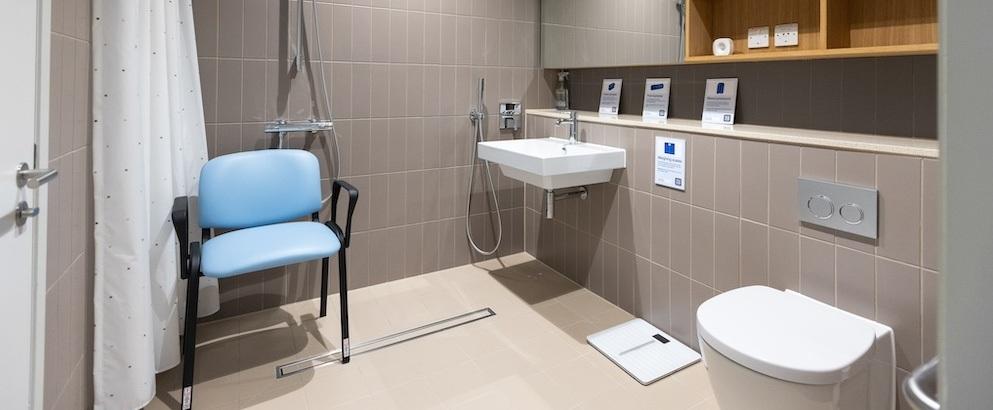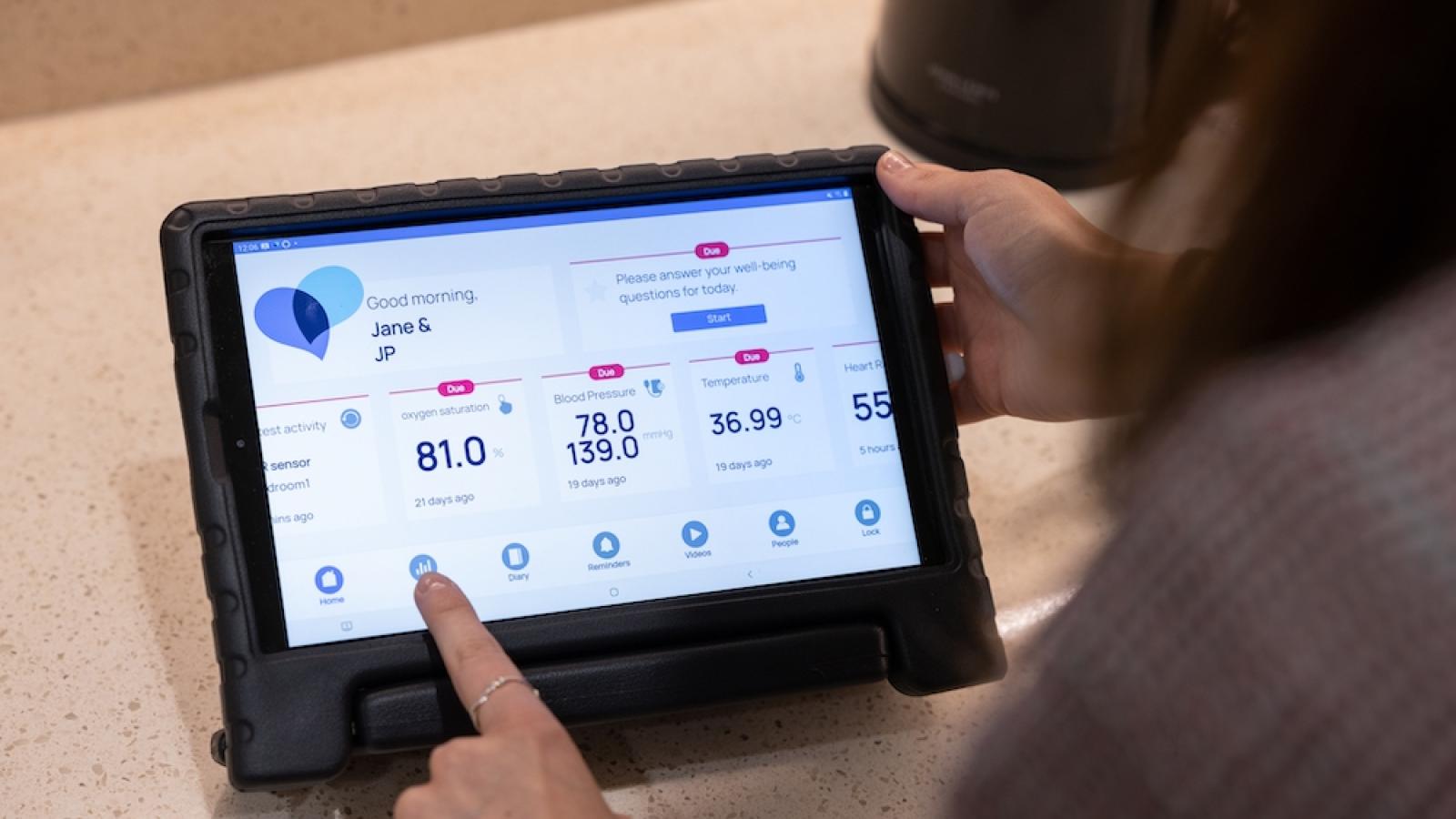Using technology to improve the lives of people living with dementia
Prof David Sharp and his team are using radical new approaches to assess the effects of dementia and improve the lives of people living with the condition. The team are creating smart sensors that can collect data about a person’s behavioural patterns in the home and using artificial intelligence to make predictions about what that person might do. They will use this information to develop ways to support them as their dementia progresses – for instance, through the use of intelligent cues that can help prompt them to do things.
The team have also previously developed software – called CogniTrack – that enables regular computerised home-based testing of a person’s cognitive abilities e.g. thinking, learning, memory and understanding. They will investigate whether this can provide a more sensitive measurement of a person’s brain function over the long-term, compared with standard face-to-face assessments. Combining CogniTrack data with a individual’s behavioural information will enable them to study the relationship between real-life behaviours and cognitive function in unprecedented detail.
The Sharp Lab will also explore exciting opportunities to improve the cognitive abilities of people with dementia – such as their memory function. They will use mobile electroencephalography (EEG) sensors to detect unusual electrical brain activity and then investigate ways to correct this, such as through the use of intelligent cues or non-invasive electrical brain stimulation.
Prof Sharp leads the ‘ZeDTech’ dementia network – developing zero burden and sustainable technologies to support independent living with dementia – which brings together teams of researchers, developers, engineers and health and social care professionals. It is one of four new Dementia Networks across the UK, funded by a total investment of £6million from the UKRI Engineering and Physical Sciences Research Council (EPSRC) and the National Institute for Health and Care Research (NIHR). Each network focuses on a different challenge facing people living with dementia.
Latest news



Prof David Sharp
Prof David Sharp is a Group Leader and Centre Director at the UK DRI Centre for Care Research & Technology. Find out more about his career and expertise on his profile page.

Research summary

Environmental sensors around the home can be used to gain valuable information about a person's cognitive state. Credit: Dan Weill
Cognition and Behaviour
This UK DRI programme, led by Prof David Sharp, will develop ways to describe behavioural patterns in the home, providing a radical new approach to the assessment of the effects of dementia. A rich 3D description of real-world tasks can be produced using wearable sensors that can measure movement and quantify how behaviour changes during disease. The team will use these to describe how activities of daily living (ADLs) change in dementia at different stages, initially using whole-body sensor suits. These data will enable the identification of the smallest subset of wearable sensors that can derive accurate behavioural descriptions. Ultimately, this will enable artificial intelligence (AI) to be trained to produce similar descriptions from passively acquired data.
Linking behavioural descriptions to AI provides an opportunity to predict and then support the behaviour of people with dementia. The team will train AI to learn an individual’s core behavioural repertoire and then test whether this predictive information can be used to intelligently cue ADLs. For example, if an individual usually makes tea after entering the kitchen in the morning, simple auditory cues might improve autonomy as dementia progresses.
They will also assess cognitive function using CogniTrack, which delivers neuropsychological tests optimised for repeated testing, through mobile devices. They will use this system in clinical evaluation studies to perform brief weekly tests of episodic memory, working memory and attention, providing high-frequency longitudinal data. This will be compared against standard face-to-face assessments of cognition to assess whether it produces more sensitive measures of disease progression. The comparison of CogniTrack data with direct behavioural measures will also allow the relationship between real-world behaviour and underlying cognitive function to be studied in unprecedented detail.
Mobile EEG provides exciting opportunities to improve cognitive function. The team will explore whether closed-loop neuromodulation, either using environmental cueing or brain stimulation can improve cognitive function. For example, they will use simple perceptual cues to reduce the lapses of attention that are common in dementia and often produce memory impairment. Using this home EEG system and machine learning approaches to personalised analysis, they will investigate whether perceptual alerts targeted to EEG fluctuations can improve memory function by increasing attentional engagement.
David and his group have already shown the potential for transcranial electrical stimulation (TES) to enhance memory function in healthy individuals. New approaches to TES allow concurrent stimulation and EEG recording, providing the potential to link neuromodulation to ongoing brain activity. The team will investigate whether cognition in people with dementia can be enhanced by neuromodulation targeted to the occurrence of abnormal EEG activity.
Main objectives and research goals:
- To develop direct measures of real-world behavioural impairment.
- To develop artificial intelligence that learns patterns of behaviour and provides support through intelligent cueing.
- To validate CogniTrack as a platform for the longitudinal tracking of cognitive function in dementia. To enhance cognitive function through real-time monitoring of brain activity (EEG) linked to neuromodulation produced by perceptual cueing and non-invasive brain stimulation.
Key publications
Vacancies
Lab members
- Dr Peter Lally (Emerging Leader)
- Dr Lucia Li (Clinical Consultant)
- Dr Yen Foung Tai (Honorary Clinical Senior Lecturer)
- Dr Pippa Kirby (Honorary Clinical Research Fellow)
- Prof Paresh Malhotra (Clinical Consultant)
- Dr Thomas Parker (Clinical Consultant)
- Dr Greg Scott (Clinical Consultant)
- Dr David Wingfield (Clinical Consultant)
- Dr Suzie Cro (Senior Lecturer)
- Dr Abidemi Otaiku (Clinical Researcher)
- Chloe Walsh (Clinical Research Assistant)
- Janibo Amadecassimo (Dementia Clinical Nurse Specialist)
- Dr Michael David (Research Fellow)
- Dr Neil Graham (Postdoctoral Researcher)
- Dr Julian Jeyasingh Jacob (Postdoctoral Researcher)
- Dr Magda Kolanko (Research Fellow)
- Dr Emma Jane Mallas (Postdoctoral Researcher)
- Dr Eyal Sorek (Postdoctoral Researcher)
- Dr Alina-Irina Serban (Postdoctoral Researcher)
- Dr Claire Baker (Research Associate)
- Cheryl See (Research Associate)
- Elisabetta Maragnoli (CR&T Researcher)
- Monica Morim (CR&T Clinical Research Fellow)
- Caleigh Lynch (Research Assistant)
- Martina Del Giovane (Research Assistant and PhD Student)
- Helen Lai (Research Assistant and PhD Student)
- Grace Blissitt (Research Assistant)
- Oliver Sargentoni (Research Assistant)
- Amy Alves (Research Assistant)
- Mahan Heydari (Research Assistant)
- Amie Wallman-Jones (Research Assistant)
- Hollie O'Hanlon (Research Assistant)
- Matthew Harrison (Staff Scientist)
- Sophie Horrocks (Staff Scientist)
- Amer Marzuki (Software Engineer)
- Anna Joffe (Senior Software Developer)
- Mark Woodbridge (Senior Software Developer)
- Joanna James (Honorary Senior Research Officer)
- Anastasia Gailly-de-taurines (Technician)
- Jessica Hain (Technician and PhD Student)
- Fabusoro Success (Technician)
- Jenna Yun (Research Technician)
- Xueyuan Quan (Software Engineer)
- Ramsheed Abdul Rahim (Software Developer)
- Melissa Rajalingam (Data audit)
- Mae Fletcher (Project Support)
- Niall Bourke (PhD Student)
- Alan Kyle (PhD Student)
- Yuen Yee (Prisca) Shiu (PA/Administrator)
- Erin Rooney (Honorary Research Assistant and PhD Student)
- Gaia Frigerio (Research Technician)
- Sutong Li (Research Postgraduate)
- Zinka Zecevic (CR&T Clinical Research Fellow)
- Danielle Roberts (PhD Student)
- Farah Hariss (Research Assistant)
- Lydia Orton (PhD Student)
Collaborators


Lab funders
Thank you to all those who support the Sharp Lab!
